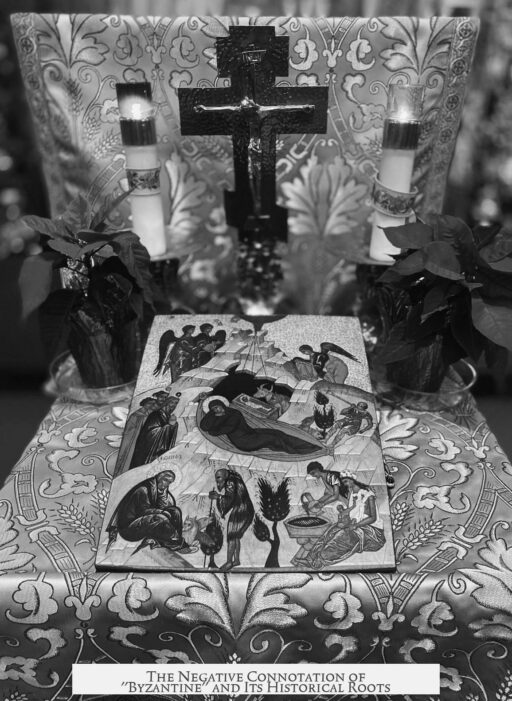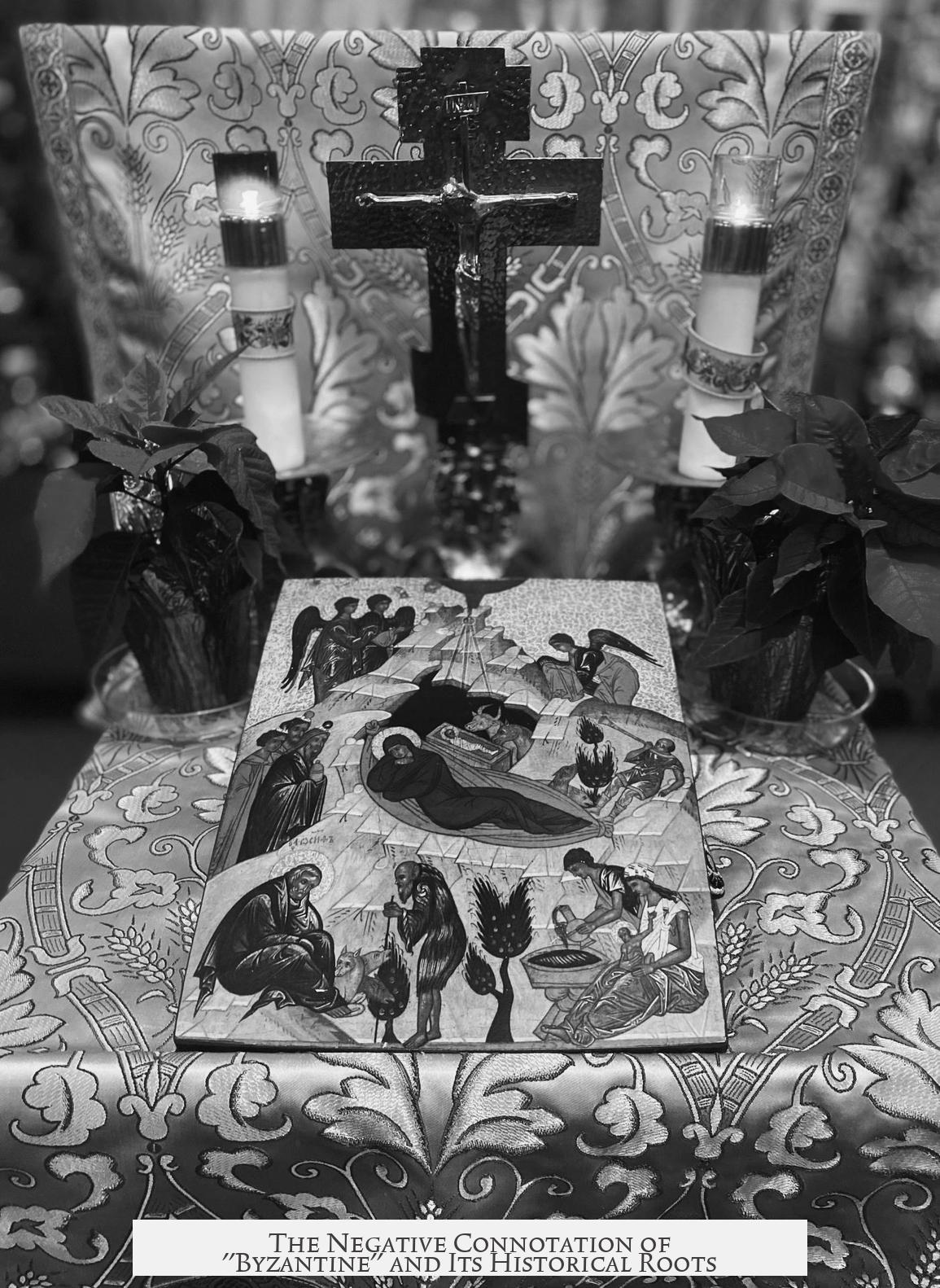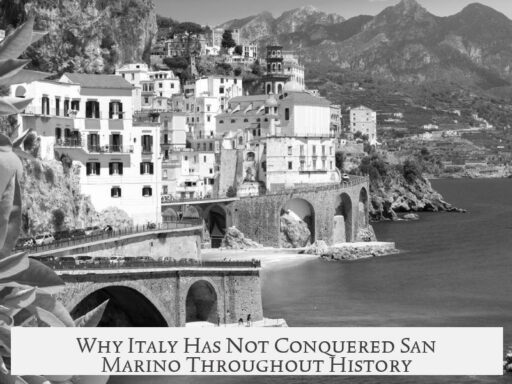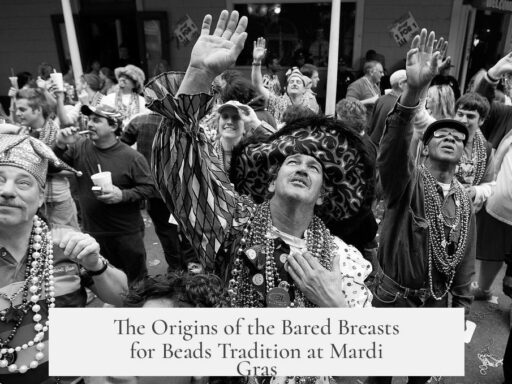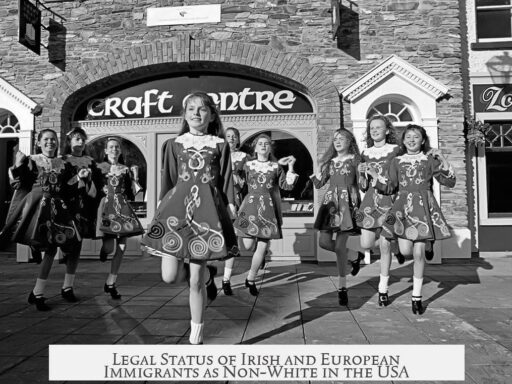The adjective “Byzantine” acquired its negative connotation due to the historical reputation of the Byzantine Empire’s imperial court for political intrigue, treachery, and an excessively complex bureaucracy. This legacy shaped the term into a descriptor for something excessively complicated, conniving, and convoluted.
The Byzantine imperial court became infamous for schemes and convoluted plotting. It governed through a massive and intricate civil service. This complex system appeared frustratingly tangled to outsiders. Over time, “Byzantine” came to describe not just the empire but any situation marked by labyrinthine bureaucracy or deceitful politics.
The negative meaning has endured, largely unchallenged, because the Byzantine Empire fell over 550 years ago. Unlike cultures with surviving direct descendants or national identities, Byzantium lacks modern advocates to improve or reclaim its image. Thus, its unfavorable connotation remains embedded in Western cultural memory.
Religious and political factors significantly contributed to this perception. The East-West Christian schism of 1054 divided Christianity into Roman Catholicism in the West and Eastern Orthodoxy led by Byzantium.
Though the theological differences were minor—such as the type of bread used in the Eucharist—the split represented a deep political divide. Western Christians viewed Byzantines as heretics, equating them somewhat with Muslims or pagans despite their shared Christian roots. This fostered distrust and unfavorable portrayals, especially in Western Europe.
Additional political rivalry with the Western Roman Empire and its successors fueled negative propaganda. The Western powers resented Byzantium’s continued claim as the Roman Empire’s heir and spread disparagement. Following its fall, the Ottoman Empire carried its own hostile narrative, portraying Byzantines as weak or evil to justify conquest.
Maritime republics like Venice and Pisa, which competed commercially and politically with Byzantium, also engaged in propaganda against them. The Papacy after the schism used language and actions designed to diminish Byzantine prestige and bolster its own authority in Christendom.
Byzantine political life was notoriously complex, often described as a “divide and conquer” environment elevated to an art form. Imperial court factions, church authorities, and political groups engaged in elaborate schemes and rivalries. This contributed to the term’s use today to denote intricate and devious scheming.
In modern times, no nation or culture strongly claims Byzantine heritage as a spiritual successor. Turkey, successor to the Ottoman Empire which conquered Byzantium, does not emphasize Byzantine roots. Greece and Eastern Orthodox countries acknowledge the empire’s influence but do not universally regard it as central to their modern identity. Consequently, historians predominantly preserve Byzantine legacy, while popular cultural references maintain the negative adjective usage.
Laypeople in the West often view Western Civilization as descending directly from ancient Greece and Rome, with Byzantium regarded as peripheral or irrelevant. This narrow perspective overlooks Byzantine contributions to law, art, and theology, reinforcing dismissive or negative attitudes toward the empire, and by extension, the adjective derived from its name.
Primary medieval sources shaped early perceptions. For example, Liutprand of Cremona, a 10th-century diplomat, expressed deep dislike of Byzantines. Such sources might have influenced subsequent Western attitudes by highlighting what they saw as Byzantine duplicity and complexity. Although these accounts arose in specific political contexts, their narratives survived, reinforcing negative connotations.
| Key Factors Explaining the Negative Connotation of “Byzantine” |
|---|
| Political Intrigue: Byzantine imperial court known for schemes and treachery. |
| Complex Bureaucracy: Massive, tangled civil administration created a perception of frustrating complexity. |
| Religious Schism: East-West Christian split led West to view Byzantines as heretics. |
| Western and Ottoman Propaganda: Rival powers spread negative images for political advantage. |
| Maritime Rivalries and Papal Efforts: Venice, Pisa, and the Papacy undermined Byzantine prestige. |
| Lack of Modern Advocacy: No strong cultural successor to challenge or rehabilitate Byzantium’s image. |
| Western Cultural Perception: Seen as irrelevant or peripheral, minimizing Byzantine contributions. |
| Medieval Negative Sources: Figures like Liutprand documented unfavorable views. |
- “Byzantine” reflects the empire’s notorious complexity and political scheming.
- Religious and political divides deeply shaped Western negative views.
- Rivalries and propaganda reinforced these perceptions.
- No modern cultural heir actively contests or softens the term’s meaning.
- Lay perspectives in the West often marginalize Byzantine importance.
- Early historical writings aided the long-lasting negative connotation.
How did the adjective “Byzantine” come to have such a negative connotation?
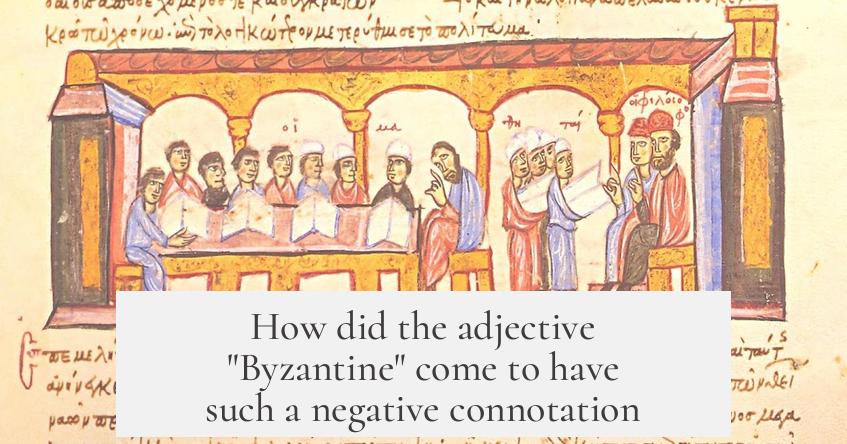
In short, the adjective byzantine earned its negative meaning from the Byzantine Empire’s reputation for deceitful political intrigue and complicated bureaucracy. But let’s rewind for a moment and look at how a proud, thousand-year-old empire ended up with a word that essentially screams “overly complex and shady.”
It’s a story tangled with history, politics, religion, and a dash of cultural neglect. So, how exactly did the term “byzantine” turn into the shorthand for “absurdly complicated and untrustworthy”?
The Root of the Negative Meaning
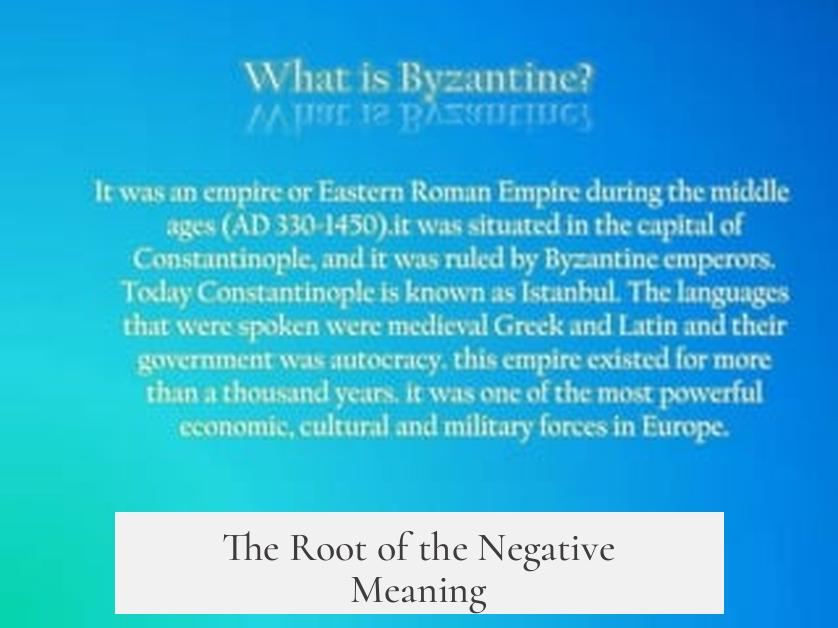
The Byzantine imperial court was famous for its scheming. Emperors had to navigate an endless maze of plots and backstabbing. Imagine an office environment, but with daggers behind backs. That court was a hotbed of treachery and political intrigue.
Plus, the empire’s civil service bureaucracy resembled an ancient version of a tangled ball of string. This wasn’t your typical government system; it was a sprawling, knotted, complex mess. So, when people later used the adjective “byzantine,” it naturally reflected this frustrating complexity and sneakiness.
Did Religious Rivalries Add to the Negative Image?
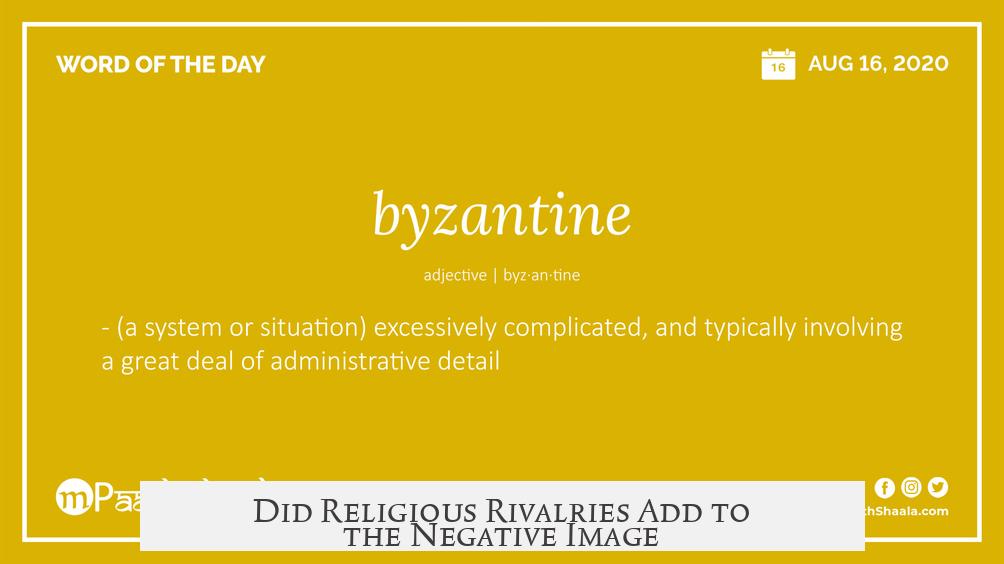
Absolutely. The religious schism between East and West Christians was less about doctrine and more political wartime drama. The Byzantines refused to bow to the Pope’s authority. To the Western Church at the time, they became “heretics”—practically in the same league as Muslims or Pagans.
This split wasn’t just spiritual; it was fiercely political. It fueled a widespread Western disdain. When the Western Church tagged Byzantines as religious outcasts, it gave a negative spin to everything about them.
Western Roman Empire and Ottoman Propaganda Didn’t Help

The Western Roman Empire and its successors hated the Byzantines. What is hate if not a powerful force for reputation damage? Propaganda from the West painted Byzantines as conniving and weak.
Later, the Ottomans—who conquered Constantinople in 1453—spun a narrative claiming their victory was due to Byzantine treachery or moral failings. So, both sides contributed to the bad rap. Who wouldn’t feel misunderstood with history’s mixed messages?
Venetian and Papal Drama Also Added Fuel to the Fire
Don’t forget the maritime rivals, Venice and Pisa. These city-states competed fiercely with Byzantium in trade.
Venetian and Pisan propaganda, combined with Papal efforts to boost its own clout, all helped turn public perception against the Byzantines.
The Church wanted to shine post-schism, and merchants had every incentive to discredit a trade competitor. So, the idea that Byzantines were “underhanded” gained traction in Europe.
What About the Empire’s Intricate Bureaucracy and Political Intrigue?
Picture a game of chess turned up to eleven. The days at the emperor’s court involved plotting that would make modern political strategists gape.
“Divide and conquer” wasn’t just a tactic; it was an art form. Political parties, the church, and the emperor all played complex roles in an elaborate dance of influence.
That’s why “byzantine” came to mean more than just complex — essentially, it implied deliberately confusing and devious.
Why Has This Negative Meaning Stuck Around for So Long?
Well, cultural sensitivity hasn’t exactly rushed to the rescue of an empire that crumbled over 550 years ago.
No modern nation directly claims to be the spiritual heir of Byzantium. Turkey, Greece, and others respect their histories but don’t champion Byzantine legacy publicly.
Meaning, historians do the heavy lifting in protecting Byzantine heritage, while the rest of the world is free to keep using “byzantine” to mean “complicated and frustrating.”
How Do Laypeople and the Western World See Byzantium?
- The Byzantine Empire feels remote and disconnected from modern Western identity.
- Whereas Greece and Rome are hailed as foundational, Byzantium often gets dismissed as irrelevant or a pretender.
- This disconnect causes casual observers to overlook Byzantine contributions and more easily accept negative stereotypes.
One reason? Byzantine culture was Eastern Orthodox and Greek-speaking, not Latin-speaking like the West, making it harder for Western Europeans to relate.
Were Early Historians Also Part of the Problem?
Yep. Take Liutprand of Cremona, a 10th-century diplomat who wasn’t exactly a fan of the Byzantines. His writings hurled plenty of insults and portrayed them as devious.
Accounts like his influenced medieval perceptions and helped seed a lasting negative view in Europe.
Modern Implications of the Word “Byzantine”
Today, calling a system or process “byzantine” usually means it’s excessively complex, unnecessarily convoluted, or scheming behind the scenes.
Think tangled regulations, endless paperwork, or political machinations that make your head spin. The word draws directly from the Byzantine Empire’s reputation, even if that depiction oversimplifies one of history’s longest-lasting empires.
Can We Appreciate Byzantium Beyond the Negative Label?
Absolutely. The term “byzantine” carries so much baggage, it’s easy to forget this empire preserved Roman law, advanced Orthodox Christianity, and kept classical knowledge alive through a chaotic medieval period.
But without a strong cultural advocate, these success stories rarely make it into mainstream perception. Instead, “byzantine” sticks as a symbol of complexity and intrigue.
So, What Can Readers Take Away?
- Understand the origin: The negative connotation reflects historical realities of political intrigue and bureaucracy, mixed with slanted perspectives.
- Question the stereotypes: “Byzantine” is often an oversimplification shaped by centuries of rivalry, religious conflict, and propaganda.
- Context matters: Use the adjective carefully, knowing its roots and the deeper story behind it.
- Appreciate the complexity: Recognize that behind the negative label lies a civilization rich in culture, law, and art.
Next time you call a process or system “byzantine,” consider this: you’re invoking a thousand years of history, politics, religious drama, and rivalries. Maybe use the word with a bit more respect—or maybe just embrace the tangled mess it suggests!
How do you feel about words with such heavy historical shadows? Does knowing the backstory change your view of “byzantine” or is it just a handy shorthand for “messy”? Feel free to weigh in!
